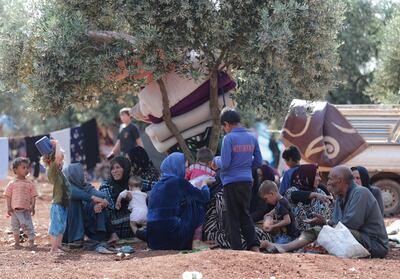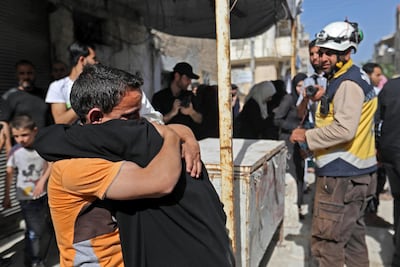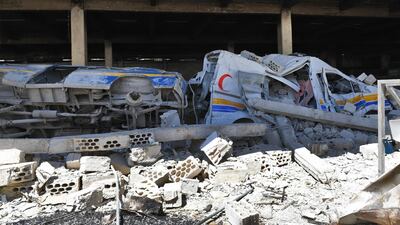The United Nations Security Council on Friday clashed over the situation in Syria with Russia being accused of bombing hospitals and killing civilians after several weeks of aerial bombardment and a limited ground offensive.
The violence in the northeastern province of Idlib has effectively shattered a cease-fire negotiated by Russia and Turkey, in place since September. Russia has firmly backed President Bashar Al Assad's government in the eight-year civil war, while Turkey has supported rebel factions.
Some 3 million civilians are now at risk, the United Nations said.
"Since we know that Russia and Syria are the only countries that fly planes in the area, is the answer ... the Russian and Syrian air forces?" Britain's UN Ambassador Karen Pierce said to the 15-member council on where the blame lay.
Acting US Ambassador to the United Nations Jonathan Cohen said Russia and Syria were responsible for the attacks on the health centres. He said it was "most alarming" that several of the centres attacked were on a list created by Russia and the United Nations in an attempt to protect them.
Mr Pierce said it would be "absolutely grotesque" if health facilities that provided their locations were "finding themselves being the authors of their own destruction because of deliberated targeting by the regime."
But Russia’s ambassador pushed back. Vassily Nebenzia said the Syrian and Russian forces were not targeting civilians or civilian infrastructure and questioned the sources used by the United Nations to verify attacks on health centres.
"We categorically reject accusations of violations of international humanitarian law," Mr Nebenzia told the council. "Our goal is the terrorists."
An array of insurgents have a foothold in northwestern Syria - Idlib province and a belt of territory around it. The most powerful is Hayat Tahrir Al Sham, the latest incarnation of the former Nusra Front which was part of al Qaeda until 2016.
The meeting came as the UN aid head and dozens of international humanitarian organisations warned that humanitarian conditions in Syria's northwest have reached a new "crisis point.”
In their appeal issued on Friday, some 70 aid groups called for an immediate end to the fighting. They said that the violence has displaced an estimated 180,000 people in the last two weeks alone. The rebel enclave, which stretches between northern Hama and most of Idlib provinces, is home to 3 million people.

The violence has forced at least 16 humanitarian organizations to suspend their operations in the region, the groups added. The staff were either displaced themselves or the facilities came under attack.
UN humanitarian chief Mark Lowcock said his worst fears that a full-scale military onslaught in northwestern Syria would "unleash a humanitarian nightmare unlike any we have seen" in Syria are now coming true.
Mr Lowcock told a Security Council meeting that escalating violence in the last three weeks in the de-escalation zone in rebel-held Idlib killed up to 160 people, displaced at least 180,000 and left millions "crammed into an ever smaller area."
UN political chief Rosemary DiCarlo warned that "if the escalation continues and the offensive pushes forward, we risk catastrophic humanitarian fallout and threats to international peace and security."
She reiterated the UN's call for an urgent de-escalation of violence and urged Turkey and Russia to re-establish a cease-fire in northwest Syria.
Turkey on Friday said the Syrian government has violated the agreement on Idlib.
"The regime is not keeping its promises of a ceasefire despite the agreement and is violating the ceasefire," Defence Minister Hulusi Akar said in a statement on the ministry's website, adding that an escalation in violence could lead to a humanitarian tragedy.
The ministry earlier said a joint working group between Ankara and Moscow had met in the Turkish capital on Thursday and Friday to discuss Idlib, the Sochi agreement and the Astana process - multi-sided efforts to try to provide stability in Syria.
Moscow had been piling pressure on Ankara to start an operation against the opposition-held areas after Turkey's failure to push rebels to agree to Russian patrols and get al Qaeda-inspired militants out of a buffer zone that underpinned the Turkish-Russian deal.

Physicians for Human Rights said it has verified that over the last four weeks Syrian government forces and their Russian allies have carried out nine attacks on hospitals and medical facilities.
The aid groups said that at least 15 health facilities and 16 schools were reported to have been significantly damaged or destroyed. At least two health workers were killed.
The groups said at least four clearly identified humanitarian posts were targeted, condemning the "failure" to observe international law.
In a statement, Amnesty International called on the UN Security Council to pressure Russia over the "deliberate" targeting of health and education facilities and ending the "onslaught" against civilians during Friday’s meeting.
"Bombing hospitals carrying out their medical functions is a war crime," said Lynn Maalouf, Amnesty International's director of research for the Middle East. Ms Maalouf said it was part of a "well-established" pattern by the Syrian government and its allies.
"The international community has so far utterly failed to protect civilians in Syria from the horrors of this conflict," she said.
Staff from four hospitals in Idlib and Hama told Amnesty International that they had been targeted despite sharing their coordinates with the Syrian and Russian governments.
In fighting on Friday, activists and insurgents said government forces attempted to push into a new village in western Hama but were repelled.
But also on Friday, Damascus finalized a deal with Hayat Tahrir Al Sham to exchange dozens of prisoners. The militant group reportedly released nine people, including two women and a child, in exchange for 27 people held by the regime. There was no detail on those released by the government.

The head of Hayat Tahrir Al Sham also urged Turkish backed groups to the north of the region to take up arms against the regime to ease pressure on the militant-held bastion of Idlib.
Hayat Tahrir Al Sham controls most of Idlib province as well as parts of neighbouring Aleppo, Hama and Latakia provinces.
The group’s head Abu Mohammed Al Jolani released a video on Friday on the group's messaging app Telegram, saying fighters backed by Turkey "could help us by launching an operation in Aleppo, for example".
"Dispersing the enemy and opening up new fronts is in our interest," he added.
Jolani's call comes days after he urged supporters to "take up weapons" to defend Idlib.
Turkey, a longtime backer of Syria's rebels, supports various groups in Idlib to differing degrees and has actively sought to unify them.
Ankara also operates monitoring posts in Idlib, positioned in a horseshoe-shape around the edges of rebel territory, and has troops deployed to the east in Aleppo province.
The Turkish army has launched two major operations in Syria dubbed "Euphrates Shield" in 2016 and "Olive Branch" in 2018 to combat Syrian Kurdish fighters as well as Islamic State group jihadists.

